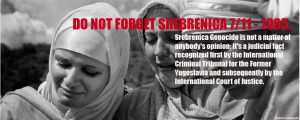Requiem for a court
Professor dr. Srđa Pavlović is the Member of the International Expert Team of the Institute for Research of Genocide, Canada
What is more important: to dispense justice or to achieve some kind of peace? The court in The Hague wrote the history of the Yugoslav dissolution by politically motivated parcelling of responsibility among former belligerents. This new historical narrative will have far reaching negative consequences.
In 2011 the International Criminal Tribunal for the Former Yugoslavia (ICTY) in The Hague convicted the former Chief of the General Staff of the Yugoslav Army, Colonel General Momčilo Perišić for aiding and abetting war crimes in Croatia and Bosnia-Herzegovina, and sentenced him to serve 27 years in prison. On February 28, 2013 the Appeal Chamber of the ICTY acquitted him of all charges. This decision of the Appeal Chamber is the latest in a series of highly controversial judgements of this international legal body.
It is closing time in The Hague, and the powers behind the bench have decided to forgive, forget, and close the court files on the wars in the former Yugoslavia. The international community and the ICTY are tired of dealing with the ghosts of the Yugoslav collapse, and wish to exit this house divided as soon as possible.
Every side in those wars has received parting gifts from the ICTY. Those included the judgements on the Croatian Operation Storm, and the lack of culpability of Serbia in the Srebrenica genocide but also the acquittals of the former officer of the Bosnian Army, Naser Orić and of the Croatian generals Gotovina and Markač as well as the former Prime Minister of Kosovo, Ramush Haradinaj. One must hope that the latest reversal of Perišić’s original sentence was the last-remaining gift-basket, before the shop in The Hague closes its doors for good.
Notwithstanding the controversies surrounding the work done by the ICTY, one needs to acknowledge a number of good things that came out of the proceedings in The Hague over the last twenty years. The most obvious is the amassing of the evidence on genocide and war crimes committed, and processing a number of those found responsible. The body of evidence available in the court archives is a significant depository of information crucial for researchers who desire to fully understand the complexity of the Yugoslav wars. Moreover, the ICTY did set the precedent by bringing to trial a president of a country. Outside of the trial chamber, court experts worked on modernizing and strengthening legal infrastructures in the Yugoslav successor states, and even helped create new legal bodies to address war-related issues on the local level.
It is equally important to stress that the many decisions taken by the Appeal Chamber cast a shadow over the proclaimed mandate of this court. The acquittal of Colonel General Momčilo Perišić further darkens that shadow and breathes new life into the longstanding argument of nationalists about the ICTY as a political court. Even though the political nature of the ICTY does not differ much from that of earlier international legal bodies that dealt with war crimes and genocide, the freeing of Perišić has highlighted a number of structural faults of the court, exposing the political short-sightedness that produced them.
From its inception, the ICTY fostered unrealistic hopes of local communities that their individual and collective suffering would be fully acknowledged and addressed through convicting those directly responsible and those who designed policies that led to war crimes being committed. Furthermore, the ICTY was projected as the institution that could and would dispense absolute justice to all those who were wronged.
The ICTY has failed on both counts because its work was primarily guided by political considerations and the logic of compromise. Those considerations often caused strong disagreements between prosecutor and the judges over the most effective and desirable avenue of advance in achieving justice. Following the strings of problematic acquittals, the initial promise of honouring all the victims and punishing the guilty, including the creators of policies of ethnic cleansing and genocide now has a hollow ring to it. The strings of acquittals not only eroded an ever-thinning layer of confidence in the impartiality of international justice, but once again victimised those who survived the ethnic cleansing of Operation Storm, the genocide in Srebrenica, and the shelling of Zadar and Mostar, as well as many other killing fields in Bosnia and Croatia. They feel abandoned by international law.
To be fair to the ICTY, however, one should stress that victims did not fare much better in their respective states. National governments in Croatia, Serbia, and Bosnia and Herzegovina alike have shown remarkable disregard for the needs of their own war veterans, refugees, and displaced persons. While allocating significant funds for the support and defence of their former officials and officers on trial in The Hague, these governments did precious little to alleviate the suffering of thousands of ordinary citizens whose lives have been forever altered by war.
Over the last two decades, western diplomats struggled with the question of how to end the Yugoslav conflict and what is more important: to dispense justice or to achieve some kind of peace? The politics of pacification and the projections of future integrative processes in the region guided the court’s actions. It was also important to demonstrate the impartiality and the absence of nation-specific bias of the ICTY. That was achieved by acquitting both Croatian and Serbian officers in highly controversial court decisions. The hope was that such court actions would facilitate peace and prevent future reprisals. Inexorably, this deeply flawed logic of peace-making won over the hope of achieving justice for the victims.
Along the way, the international community compromised with the local national political elites and catered to their needs in order to secure their compliance with international legal bodies such as the ICTY and ICJ. The decisions of international legal bodies not to use the minutes from the meetings of the Supreme Defence Council in the case of Bosnia and Herzegovina vs Serbia and to dismiss the infamous Brioni Memo in the case of Operation Storm are striking examples of such compromise.
By doing this the international court strengthened the claims of nationalist elites in the former Yugoslav republics about the defensive nature of their wars, while it helped to portray the proverbial other as an aggressor. It also made it difficult, if not impossible, for the national courts to process cases of war crimes in the future. After the ICTY acquitted Kosovar, Croatian, Bosnian, and Serbian former officials and officers, it is hard to imagine any court in either of those states processing any future cases of war crimes, because those acquittals are taken as confirmation of absolute innocence.
These decisions of the ICTY will have far reaching negative consequences. The court wrote the history of the Yugoslav dissolution not by following the trail of evidence but by politically motivated parceling of responsibility among former belligerents. This new historical narrative reflects a compromise between the international community and national elites from the former Yugoslavia. It is the compromise about a minimum of truth everyone is able to live with. The ICTY, thus, helped create the story of the Yugoslav wars in which most victims died either from stray bullets or at the hands of paramilitary units led by psychopaths and mass murderers not affiliated to any state or any army.
The court judgments will also have a strong impact on the development of the basic meta-narratives about the recent past among different national communities in the former Yugoslavia. Those would, undoubtedly, be narratives of victimhood, in which the proverbial other is the absolute perpetrator, while a community in question heard no evil, saw no evil, and did no evil.
Thanks to the political short-sightedness of the international community and its impatience in dealing with the complex issues of the Yugoslav wars, the ICTY, at the end of the day, produced heroes and villains for various national communities in the Yugoslav successor states. Those would populate new national histories, and their biographies would become essential elements in new school curricula. This is a recipe for preserving hatred and breeding a desire for revenge, rather than inviting those involved to a dialogue that could lead to reconciliation.
http://www.opendemocracy.net/sr%C4%91-pavlovi%C4%87-christophe-solioz/requiem-for-court




